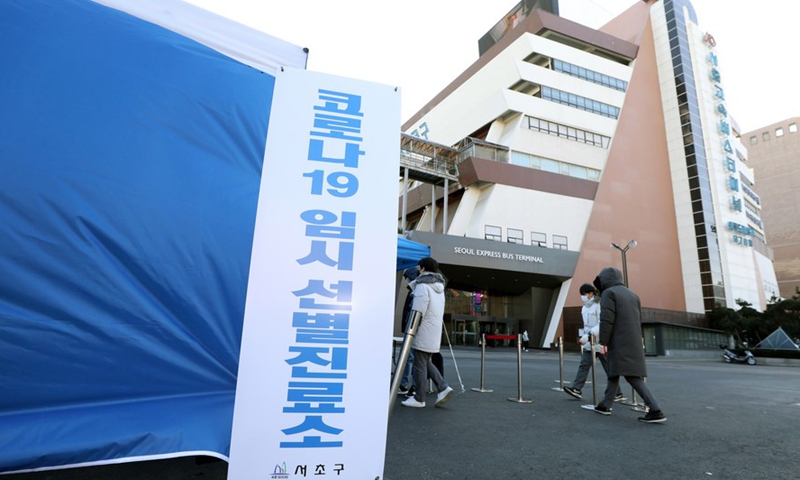
A makeshift clinic for coronavirus tests is seen near the Seoul Express Bus Terminal in Seocho-gu of Seoul, South Korea, Dec. 14, 2020. (NEWSIS/Handout via Xinhua)
South Korea's President Moon Jae-in said Monday that the country will be able to achieve faster herd immunity against COVID-19 than other countries under the planned vaccination program.
Moon told a New Year's press conference that the preliminary vaccinations, scheduled to begin in February, are planned to be completed by September and expected to generally form a herd immunity.
He said the remaining inoculations during the fourth quarter will almost completely form a herd immunity no later than November.
"(South) Korea will never lag behind, but rather will be faster than other countries when considering the vaccination schedule and the time frame to form a herd immunity," Moon said.
The government announced that it had secured COVID-19 vaccine doses for 56 million people, including doses for 10 million each from AstraZeneca and Pfizer, 20 million from Moderna, 6 million from Janssen and 10 million from the World Health Organization (WHO)-led COVAX facility.
Moon vowed to offer COVID-19 vaccines to all of the country's 52 million population free of charge in accordance with priorities, saying the COVID-19 resurgence was believed to come near to a close.
In the latest tally, the country reported 389 more confirmed cases of COVID-19 for the past 24 hours, raising the total tally to 72,729. The daily caseload fell below 400 in 54 days since Nov. 25.
The local virus spread showed signs of moderating this year as the government's five-tier social-distancing guideline was elevated to the second-highest level, slated to be kept in place for eight weeks through Jan. 31.
Regarding economic conditions, Moon forecast that the South Korean economy may achieve a recovery to the pre-COVID-19 level in the first half of this year citing the "very positive" economic indicators.
The country's real gross domestic product (GDP), adjusted for inflation, contracted 1.3 percent in the January-March quarter from three months earlier, before tumbling 3.2 percent during the April-June quarter.
The second-quarter result was the best among key economies, including members of the Organization for Economic Cooperation and Development (OECD), except for China.
The real GDP advanced 2.1 percent in the July-September quarter from the previous quarter owing to a 16.0 percent turnaround in export, which accounts for about half of the country's export-driven economy.
The country's central bank expected the real GDP to rebound 3.0 percent in 2021 after reducing 1.1 percent in 2020.
Moon noted that the positive economic data did not directly lead to the positive economic situation, which ordinary people can acknowledge, saying it may take more time to get people's livelihood and employment recovered.
Under the tightened social-distancing scheme, high-risk entertainment facilities were forced to stop operation, while brick-and-mortar businesses such as restaurants and cafes were allowed to open with restrictions.
The government began last week to distribute its third round of relief checks, which range from 1 million won (910 U.S. dollars) to 3 million won (2,730 U.S. dollars), for 2.8 million small-business owners and the self-employed people.
The relief grant is not believed to be enough to cover their losses as it is less than a monthly rent for mom-and-pop stores especially in the Seoul metropolitan area.
Moon said that if the third round of relief payment is not enough, the government may review the payment of the fourth relief checks.




